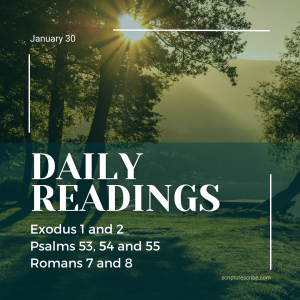
Wednesday Jul 02, 2025
Thoughts on the Bible Readings (1 Samuel 11, 12, Isaiah 55, Revelation 19, 20) for June 30th
How interesting that Nahash, whose name means “snake” chooses to attack the town of Saul’s birth, and he allows them to live for 7 days providing they covenant with him to have their right eyes thrust out. This of course is highly symbolic of the lust of the eyes, characteristic of serpent thinking prevailing throughout 7,000 years until Yahweh’s sworn covenant to destroy the flesh is consummated (1 John 2 verses 15-17; Revelation 20). When Saul heard of it the spirit of God came upon him and like the Levite in Judges 19 verses 29-30 he cut an ox into 12 pieces and sent it throughout all Israel. The irony being twofold: a) the first act was an unjust revenge upon their wayward kinsfolk; and, b) it was this act that caused the parlous state of Benjamin, Saul’s tribe. Israel mustered and destroyed the foe. Now Saul’s supporters went to Gilgal emboldened and intent on punishing the former detractors, which Saul wisely prevented.
In chapter 12 Samuel proclaims that he has entirely maintained justice during his judgeship. He recounts the LORD’s faithfulness in deliverance of His people in the 450 years of the Judges and tells them that it was not Samuel they were rejecting, but God. From verses 19-25 he says to them, that despite what has happened, he will continue to pray for them and urges them to serve Yahweh with all their hearts (v 20).
Isaiah commences his 55th chapter with the timeless plea to seek priceless ‘living waters’ (Psalm 42 verses 1-2; John 4 verses 10; 7:37-38; Revelation 7 verse 17; 22 verse 17). These waters flow from our Lord Jesus Christ- the cost is the laying down of our lives in following him, our captain cp Hebrews 2 verse 10; 12 verse 2). How sad the effort and expense undertaken for that which can never ultimately sustain (the lesson of the Manna Exodus 16 and Deuteronomy 8). Verses 6-9 ask us to seek Yahweh that He may be found of us when we realise the gulf between His thoughts and our own. The chapter concludes by explaining that the Almighty’s thoughts can only be found in His Word and by our consuming of this –
1 Peter 1 verse 22-25.
In Revelation 19 we firstly read of rejoicing at the overthrowing of the Roman system. It is because the long awaited judgments have been consummated. The rejoicing is from the angelic host and those saints ruling in the new Messianic heavens. Verses 6-10 speak of the Marriage of the Lamb. It is now another step closer to the filling of the entire earth with the knowledge of the glory of Yahweh, symbolising the victory of the Lamb’s warfare. The fine linen is representative of “the righteous deeds of the saints”. We must, as the prospective bride of Christ, remain faithful so that at the time of our marriage to Christ we will be one with the Lord who we love. Verse 9 tells us what a blessing this will be. The Apocalypse speaks of 7 blessings. The angel who revealed this to the Apostle John refused John’s homage, as he says that he also has been faithfully contending and witnessing for Jesus; which he says, “is the spirit (or motivation) of prophecy”. Verses 11-21 describe the going forth in war of the rider on the white horse – symbolising the righteousness of the Lamb’s warfare. The saints with Christ are also mounted on white steads; as they, too, are “called, and chosen, and faithful”. The Lamb’s white robe had been dipped in blood indicating that the saints’ source of righteousness is the offering of their leader. And Christ’s source of victory is attributed to his divine Sonship and the empowering force of the Word of God. Christ’s furious judgment is represented by the treading of grapes in a winepress. The nations are described as the ravenous birds, who will be invited to feast on the Roman Church’s carcass. The total destruction of the Beast’s organisation is spoken of by their being cast into the consuming lake of fire. Chapter 20 of Revelation speaks of the events of the kingdom age – 1,000 years – termed the Millennium. The symbolic powers of sin are spoken of as being cast into a bottomless pit and chained for that term. There will be a releasing of all would be rebels at the end of the thousand years. The reason for this is to test the willing loyalty of the kingdom’s subjects. Service to God must always be on the basis of a choice made from a loving heart and not from fearful compulsion. The resurrection prior to the start of the Millennium will be of the responsible believers. From these the faithful will become the rulers of the Messianic Age. The rejected will be consigned to the “second death” from which there will be no raising. The subjects of the Millennium will be raised and judged at the end of the thousand years. The blessing upon the faithful believers of the first resurrection will be to make them king-priests (Revelation 5:9-10) ie corulers with Christ. A great white throne will be set up as the final tribunal for those who will die during the Millennium. Those adjudged to be faithful will swell the ranks of the immortals. Those who were not faithful will be consigned to sleep perpetually in the grave. Tomorrow’s readings in chapters 21-22 will show the scene of the Final Consolation.
No comments yet. Be the first to say something!